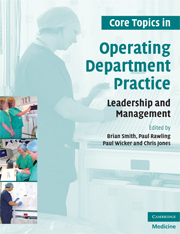Book contents
- Frontmatter
- Contents
- List of contributors
- Foreword
- Preface
- 1 Managing change in perioperative education
- 2 The role of the operating department manager within the context of the organization
- 3 Action learning: a new way of problem solving in perioperative settings
- 4 Agenda for change: what do theatre staff need to know?
- 5 The SWOT analysis: its place in strategic planning in a modern operating department
- 6 Corporate governance: setting the scene for perioperative practice
- 7 Managing different cultures: adversity and diversity in the perioperative environment
- 8 Leadership in perioperative settings: a practical guide
- 9 Management and leadership of advanced practice
- 10 Managing conflict in perioperative settings
- 11 The management and organization of emergency operating lists
- 12 Organizational culture
- 13 Development matters in the NHS; including a perioperative approach to the KSF
- 14 Equipment procurement: a purchaser's guide for theatre managers
- 15 The reflective practitioner in perioperative settings
- 16 New ways of working in perioperative practice
- 17 Damned if you do and damned if you don't: whistle blowing in perioperative practice
- 18 A manager's experience of recruitment and retention
- 19 The management of change
- Index
- References
14 - Equipment procurement: a purchaser's guide for theatre managers
- Frontmatter
- Contents
- List of contributors
- Foreword
- Preface
- 1 Managing change in perioperative education
- 2 The role of the operating department manager within the context of the organization
- 3 Action learning: a new way of problem solving in perioperative settings
- 4 Agenda for change: what do theatre staff need to know?
- 5 The SWOT analysis: its place in strategic planning in a modern operating department
- 6 Corporate governance: setting the scene for perioperative practice
- 7 Managing different cultures: adversity and diversity in the perioperative environment
- 8 Leadership in perioperative settings: a practical guide
- 9 Management and leadership of advanced practice
- 10 Managing conflict in perioperative settings
- 11 The management and organization of emergency operating lists
- 12 Organizational culture
- 13 Development matters in the NHS; including a perioperative approach to the KSF
- 14 Equipment procurement: a purchaser's guide for theatre managers
- 15 The reflective practitioner in perioperative settings
- 16 New ways of working in perioperative practice
- 17 Damned if you do and damned if you don't: whistle blowing in perioperative practice
- 18 A manager's experience of recruitment and retention
- 19 The management of change
- Index
- References
Summary
Key Learning Points
Understand the models used when considering purchases
Appreciate the value of differing actors in the purchasing process
Enhance effectiveness in purchasing for theatres by engaging more effectively with the purchasing team
Introduction
There are many sayings to do with looking after finances. Two are are ‘Look after the pennies and the pounds will look after themselves’ and ‘Penny wise pound foolish’. While the first saying has truth, it can often distract you from the second.
This chapter is intended to provide some advice and guidance on how to look after an operating theatre budget and get the most for each pound. It is often a lot easier to save money from current spending than it is to get new funding for improved patient care, and it can also be more rewarding.
Purchasing has grown in recent years from a clerical function to a strategic function (Ellram & Carr 1994), becoming a leading profession in business. The big supermarkets, car manufacturers and service providers – transport, leisure and banking – all rely heavily on their ability to specify, buy and manage their goods and services to give them a competitive and leading edge in the market. Similar to accountants and surveyors, purchasing professionals build on their academic qualifications and further develop their specialist knowledge, experience, tools and techniques in purchasing and supply.
- Type
- Chapter
- Information
- Core Topics in Operating Department PracticeLeadership and Management, pp. 121 - 128Publisher: Cambridge University PressPrint publication year: 2009

